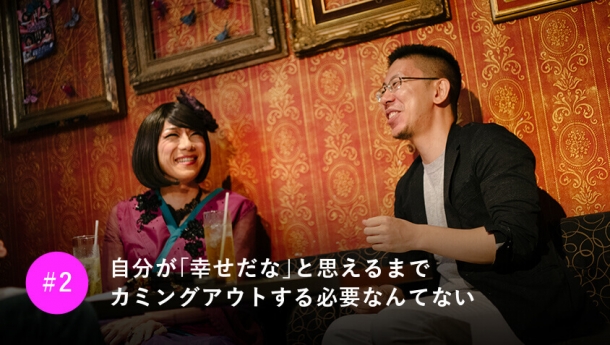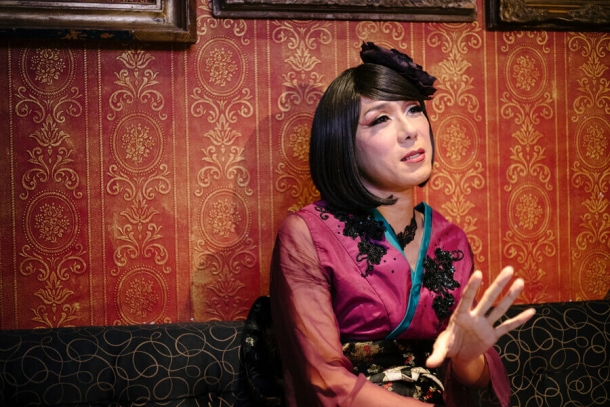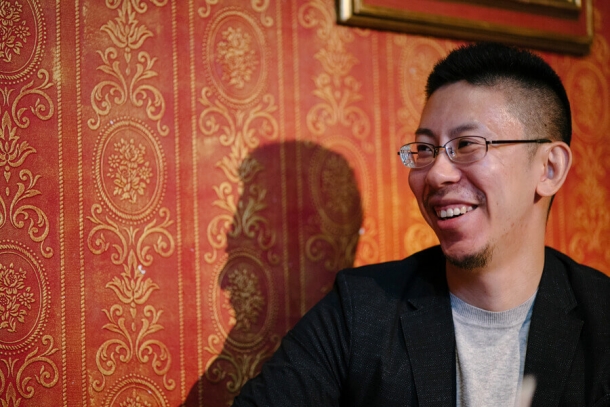
#2 Until You Can Feel “Happy,” There’s No Need to Come Out
Q. There is a considerable number of students who are afraid of coming out to their parents. What are your thoughts on coming-out-related issues?
Bourbonne
Ah, the parent problem. Even though I live this way, I wasn’t able to tell my parents until after I turned 30. I truly understand the feeling of not being able to tell your parents. There’s no coming back from it, and it’s something you have to carry with you regardless of their reaction. It’s normal to not want to open Pandora’s box.
With that said, if you preoccupy yourself with negative thoughts, you only see negative results. If you’re positive, you’ll be able to communicate information in a positive way, and, as a result, the other party will more likely accept what you say.
If you approach it as though you’re confessing some sort of sin, the other party will naturally interpret what you say negatively and think, “Life must be tough for them.”

I think until you feel that you want to come out to your parents in order to assure them you’re happy, it’s okay to wait for you to grow. If you tell them too early, your parents might feel pity for you and assume you’re embarking on a life full of strife.
Q. And in your case, Bourbonne, you didn’t come out until your thirties.
Bourbonne
Yes. And since then, I introduced them to many of my eccentric friends and invited them on trips with my gay friends. I made it a point to show them I was enjoying life.
Looking back, I’m happy I came out. But not all parents are as understanding as mine, so I can’t tell others what to do.
Q. Among parents, are there many who are uncomfortable with sexual minorities?
Bourbonne
Yes. What I tell parents at my lectures is: “The conflict your children are experiencing is not something they chose themselves. If you, the people who gave birth to them, reject this aspect of their individuality, they will feel as though you’re rejecting their entire existence.”
For example, in the case of bullying, the bullies are the first to get reprimanded. Most people want to protect children who have been hurt or excluded. But when it comes to LGBT issues, many parents feel as though they can’t continue raising their children, or feel shameful, thus placing blame on the their own children. They don’t feel that society is at fault for not accepting their children or that society is bullying their children.
That’s why I tell parents that it’s their duty to protect their children.
Moriyama
Coming out is not an easy thing to do. I want to push back on the notion that people must come out to their parents, and acknowledge the existence of those who don’t or cant come out to them. I want to talk more about the rights of sexual minorities and how they’ve found happiness.

Bourbonne
That’s a common pattern as well.
Moriyama
I understand people value their relationship with their parents, but for sexual minorities, if this conscience torments them, they should consider loosening these shackles. After all, your parents are your parents, and you are you; you’re different people.
Bourbonne
I agree. It’s also important to learn how to distance yourself from your parents. Relationships with parents are important, but individually, they’re very different people. For me, it was meaningful that I told my parents, and because they’ve been accepting, I’m now able to talk to them about anything. But if they’re not interested in having this kind of relationship, I don’t think you need to come out.



